Sleep isn’t just something nice to have; it’s a must for staying healthy. Like eating well and exercising, good sleep keeps your mind and body in shape. Sadly, many overlook its importance and don’t make it a priority.
Skipping enough sleep regularly can harm your health in big ways. Lack of sleep ups the chances of heart disease, stroke, obesity, and dementia. It can mess with your mood, make you quick to anger, and boost the odds of depression and anxiety.
For the best health, consider the three pillars of sleep: duration, quality, and a stable routine. Each is key for restful sleep that helps your body and mind recover.
Improving your sleep isn’t hard with the right habits, like a fixed bedtime and comfy sleeping space. Doing so uplifts your health and happiness.

Key Takeaways:
- Getting enough quality sleep is as important for good health as a balanced diet and regular exercise.
- Sleep deprivation can increase the risk of various diseases and disorders, including heart disease, stroke, obesity, and dementia.
- Sleep plays a crucial role in brain function, memory consolidation, and creativity.
- Proper sleep is essential for physical repair processes in the body, such as weight management and blood sugar control.
- Sleep disorders can have a significant impact on overall health and well-being.
The Three Elements of Healthy Sleep
Good sleep is crucial for your health and well-being. It makes you feel refreshed and full of energy. Also, it greatly affects your health. There are three important parts to healthy sleep: How much you sleep, how well you sleep, and keeping a regular sleep time.
The Amount of Sleep
It’s very important to sleep enough for your health. How much sleep you need changes with age:
- Adults should sleep 7-9 hours a night.
- Teenagers need about 8-10 hours.
- Young kids and babies need more sleep for growth.
It’s key to find the right amount of sleep for you.
The Quality of Sleep
How well you sleep is as important as how long. Good sleep quality means your sleep is deep and undisturbed. Better sleep quality can improve your health. Here’s how to sleep better:
- Make your bedroom comfortable: It should be cool, dark, and quiet. Use earplugs or white noise machines if you need to.
- Have a regular sleep time: Sleep and wake up at the same time every day, even on weekends. It helps your body clock work better.
- Avoid screens before bed: The blue light from phones and TVs can mess with your sleep. Try relaxing activities like reading instead.
- Be careful with caffeine and alcohol: They can disrupt sleep. Don’t have them too close to bedtime.
- Lower your stress: Being stressed can make it hard to sleep. Try meditating or deep breathing to relax.
Consistent Sleep Schedule
Keeping a regular sleep time helps your body’s sleep-wake cycle. Sleeping and waking up at the same time every day improves your sleep quality.
To sleep well, you should get enough sleep, make sure it’s good quality, and stick to a regular schedule. This will help you stay healthy and feel your best.
The Importance of Sleep for Brain Function
Getting enough sleep is crucial for our bodies and minds. It helps with learning, storing memories, and being creative. The brain goes through important processes during sleep.
Not sleeping enough can really affect our mental health. It raises the chance of feeling depressed or anxious. This is because it messes with the brain’s chemicals that control mood.
Also, sleep helps us manage our feelings better. With enough sleep, we can handle stress and emotions well. But, not sleeping enough makes us quick to anger and emotionally unstable.
Sleep is also key for thinking clearly. When we don’t sleep enough, we can’t focus or solve problems well. It gets hard to remember or learn new things.

Sleep even boosts our creativity. It helps our brain make new connections and come up with fresh ideas.
“Sleep is the golden chain that ties health and our bodies together.” – Thomas Dekker
Sleep is super important for our brains and overall happiness. We need to make sure we sleep enough. Having good sleep habits is a big part of staying mentally healthy and sharp.
Sleep for Physical Repair
Sleep is key for our body’s repair work. At night, our cells fix and renew themselves. This keeps tissues, muscles, and organs in good shape. Without enough sleep, our body can’t repair itself well. This harms our health.
Not sleeping enough can make you gain weight. It’s linked to a higher chance of getting fat. This happens because sleep loss messes with our metabolism and hunger hormones. It makes you want more food, especially junk food.
Also, not getting enough sleep affects how we control sugar in our blood. Studies show that it can lead to a higher risk of diabetes. Bad sleep messes with insulin, making it hard for the body to manage sugar levels.
Inadequate sleep can disrupt the delicate balance of our body’s repair processes, leading to weight gain and impaired blood sugar control.
We need to see sleep as key for our health. Good sleep helps our body fix itself and stay healthy. Make sure you get plenty of rest. Your body and mind will thank you.

Common Myths About Sleep
Many people believe things about sleep that aren’t true. These myths can confuse us about this important health aspect. Let’s clear up these myths and find out what’s really true.
Myth: Adults need less sleep as they get older.
Our need for sleep doesn’t lessen as we get older. Older adults might find their sleep patterns change. But, they still need plenty of rest. Not getting enough sleep can lead to serious problems. These include memory issues and higher risks of disease.
Myth: You can “catch up” on sleep.
Many think sleeping more later can fix not getting enough sleep. But, losing sleep over time has lasting bad effects. Sometimes more sleep helps, but it can’t fix ongoing lack of sleep. Getting regular, good sleep is key for health.
Understanding sleep better helps us make good choices. Good sleep habits improve our health and life quality.
Myth vs. Truth: Sleep Deprivation Effects
Let’s look at how lack of sleep affects us.
| Effects of Sleep Deprivation | Consequences |
|---|---|
| Impaired cognitive function | Difficulty concentrating, memory problems |
| Poor mood regulation | Increased irritability, mood swings |
| Increased risk of chronic conditions | Heart disease, diabetes, obesity |
| Reduced immune function | Greater susceptibility to infections |
| Impaired physical performance | Decreased coordination, slower reaction times |
The table shows sleep loss harms our minds and bodies. Sleep should be a priority for healthy living.
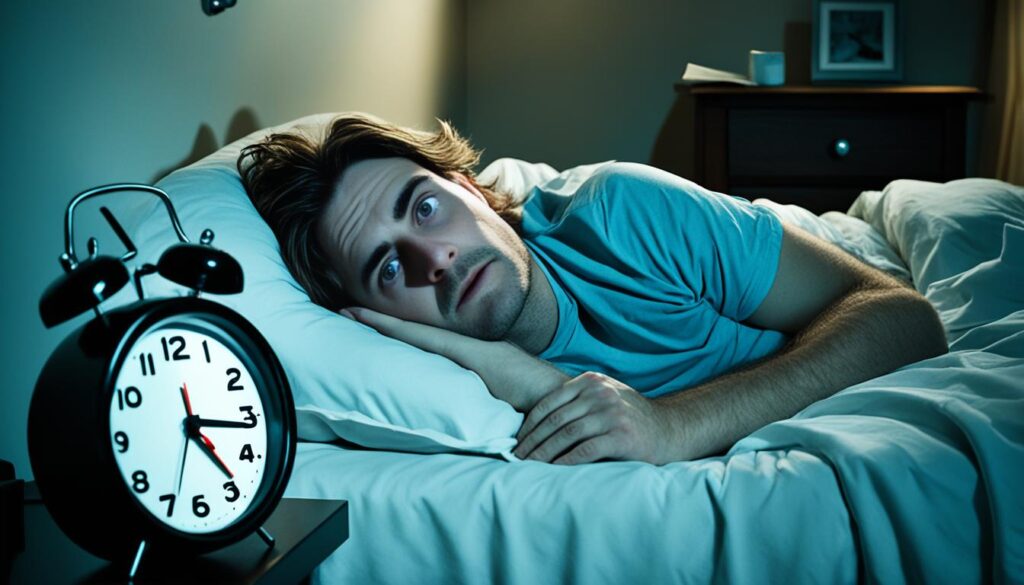
Good sleep is a must, not a luxury. By learning the truth about sleep myths, we can enjoy better health. Prioritize sleep to benefit your mind and body.
Sleep Disorders and Their Impact
Sleep is key for our health and happiness. Yet, some people have sleep disorders that make good rest hard. We’ll look at common problems like insomnia and sleep apnea, and how they affect us.
Insomnia
Insomnia means trouble getting or staying asleep. Stress, anxiety, health problems, or some medicines can cause it. If you have insomnia, you might feel very tired during the day, be in a bad mood, and have trouble thinking clearly.
“Insomnia can deeply affect your body and mind. Not sleeping enough can lead to poor thinking, bad decisions, and more accidents.”
If you’re facing insomnia, getting help early is key. Long-term insomnia could lead to mental health issues like depression or anxiety.
Sleep Apnea
Sleep apnea is when your breathing stops and starts as you sleep. These breaks can happen a lot and interrupt your sleep. Obstructive sleep apnea happens when something blocks your airway. Central sleep apnea is when your brain doesn’t tell your muscles to breathe right.
People with sleep apnea might snore loudly, feel very sleepy in the day, and wake up a lot because they feel like they’re choking. If it’s not treated, sleep apnea can lead to really serious health problems like heart disease, stroke, and diabetes.
“Sleep apnea is more common than many think, and its effects are serious. It’s important to get checked and treated.”
| Sleep Disorder | Impacts on Health |
|---|---|
| Insomnia | – Increased risk of mental health conditions – Impaired cognitive function – Elevated risk of accidents and injuries |
| Sleep Apnea | – High blood pressure – Increased risk of heart disease – Greater susceptibility to stroke and diabetes |
It’s vital to know the signs of sleep disorders to get help early. A doctor can figure out the cause and how to make your sleep better.
Keep reading to discover more about how sleep disorders affect your health and life.
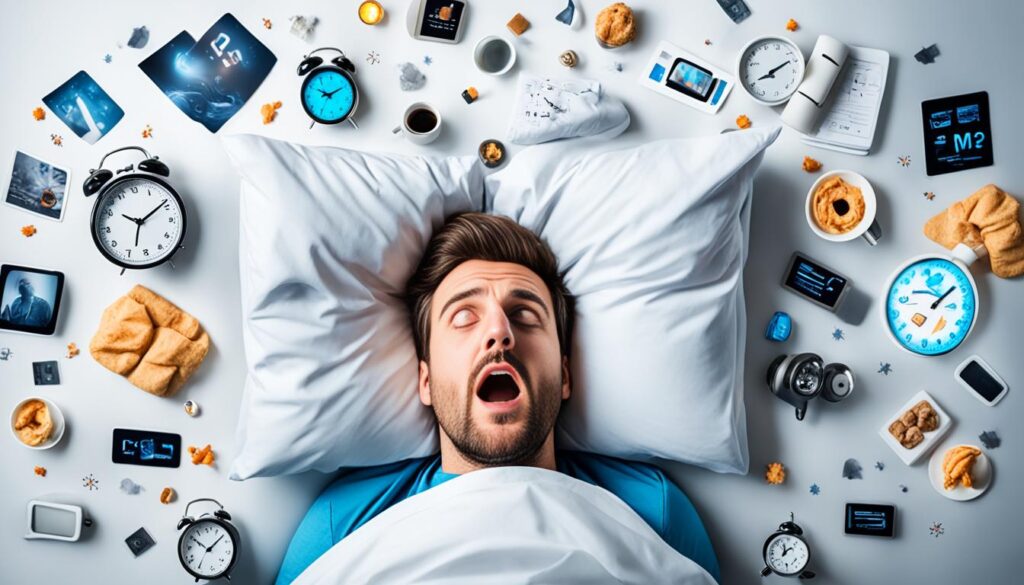
The Link Between Sleep and Children’s Health
Sleep is key for kids’ health and growth. It’s vital for their body, mind, and feelings. Getting enough sleep touches many parts of their lives.
Good sleep helps kids grow well. Their bodies make growth hormones while they snooze. This is very important for babies and toddlers. Enough sleep also keeps their immune system strong. This helps them fight off sickness.
Sleep boosts kids’ brains. Their brains sort out what they learned all day. This helps them remember stuff. Kids who sleep well do better in school. They focus better and solve problems well.
Sleep affects how kids feel and act. Tired kids can be grumpy and have a hard time behaving. Not sleeping enough makes it tough for them to deal with stress. It can even make them anxious or sad.
“Sleep is a vital component of a child’s healthy development. It impacts their physical growth, cognitive abilities, and emotional well-being.”
Sleep helps kids eat right too. Not sleeping enough can make kids overweight. It messes with hormones that control hunger. This makes them want snack foods more. It also makes it hard for them to choose healthy foods.
For kids to grow up well, sleep is key. Parents should help by making a calm bedtime routine. They should keep bedtime the same every night. This way, kids get the rest they need for their health.

| Effects of Sleep on Children’s Development | Importance of Sleep for Young Children |
|---|---|
| Promotes healthy growth and physical development | Facilitates the release of growth hormones and strengthens the immune system |
| Enhances cognitive development and learning abilities | Consolidates memories, improves academic performance, and problem-solving skills |
| Regulates emotions and behavior | Reduces mood swings, irritability, and behavioral difficulties |
| Supports healthy eating habits | Prevents obesity and helps regulate appetite and food choices |
Adolescents and Sleep Needs
Adolescence is a key time for growth. Adequate sleep is crucial for the physical and brain changes happening. Yet, many teens miss out on the needed 8-10 hours of sleep each night. This is often due to changes in their brain.
A lack of sleep can really affect how well teens do in school. Studies show that not sleeping enough can lead to poor grades. It can also make it hard for them to pay attention and remember things.
Sleep is not just important for school. It also matters for mental health. Not sleeping enough can increase the risk of depression and anxiety. Teens who don’t sleep well might also feel moodier and find it hard to control their emotions.
Parents, teachers, and doctors should help teens sleep better. They can encourage going to bed at the same time each night. They can also make sure the sleeping area is quiet and limit phone or computer use before bed. These steps can help teens sleep better and longer.
The Importance of Prioritizing Sleep for Adolescents
“Adolescence is a crucial period for brain growth. Enough sleep supports thinking and feeling well. By making sleep a priority, we help teens do their best in school and life.”
Teens need to know how important sleep is. Good sleep habits now can lead to a lifetime of better health.
Now, let’s look at the sleep needs of teens in a picture:
| Age Group | Recommended Sleep Duration |
|---|---|
| 13-18 years | 8-10 hours per night |
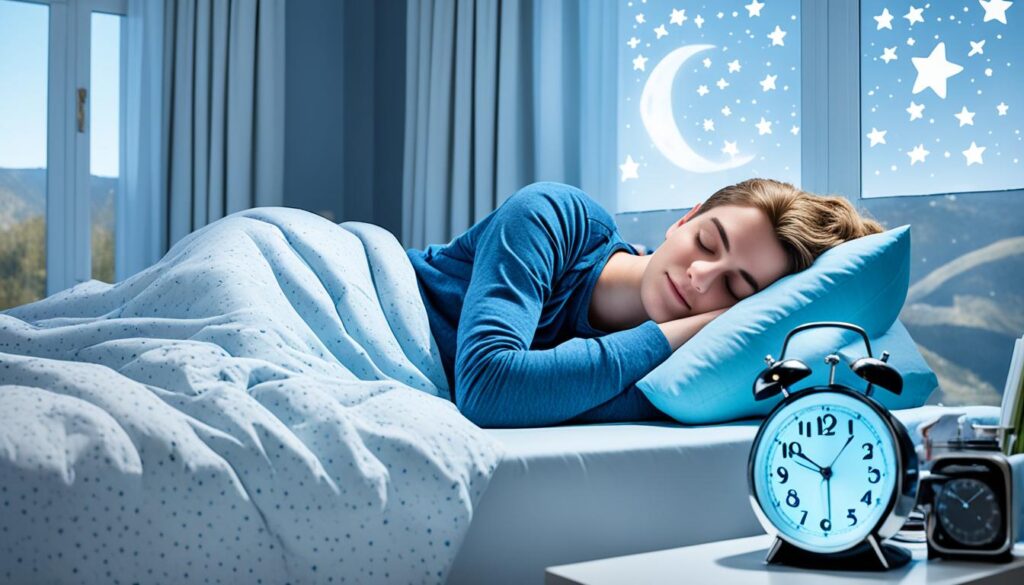
The table shows that teens aged 13-18 should get 8-10 hours of sleep each night. This helps their body, brain, and feelings.
Knowing how much sleep teens need and its benefits helps us support them. Together, we can encourage habits that lead to better sleep at this important time in their lives.
The Effects of Daylight Saving Time on Sleep
Daylight saving time makes us change our clocks in the warmer months. This helps us enjoy more evening daylight. But, it disrupts our body’s natural sleep cycle. This can mess up our sleep and overall health.
When we spring forward, we lose an hour of sleep. This can make us feel tired and out of sorts. Our body clock gets thrown off. This makes it hard to sleep and wake up when we want to.
This lack of sleep can lead to bigger problems. For instance, it can make us less alert. This increases the chance of car accidents. It can even increase the risk of heart attacks right after the time changes.
“The time change disrupts our natural circadian rhythm, causing confusion and potential health consequences.”
Because of these issues, some people think we should stop changing the time. They say it could help our health. If we kept the time the same all year, it might improve our sleep and lower risks.
Though daylight saving time helps us use daylight better, our sleep is important too. By adjusting our habits, we can deal with the time change better. This can help keep our health in check.
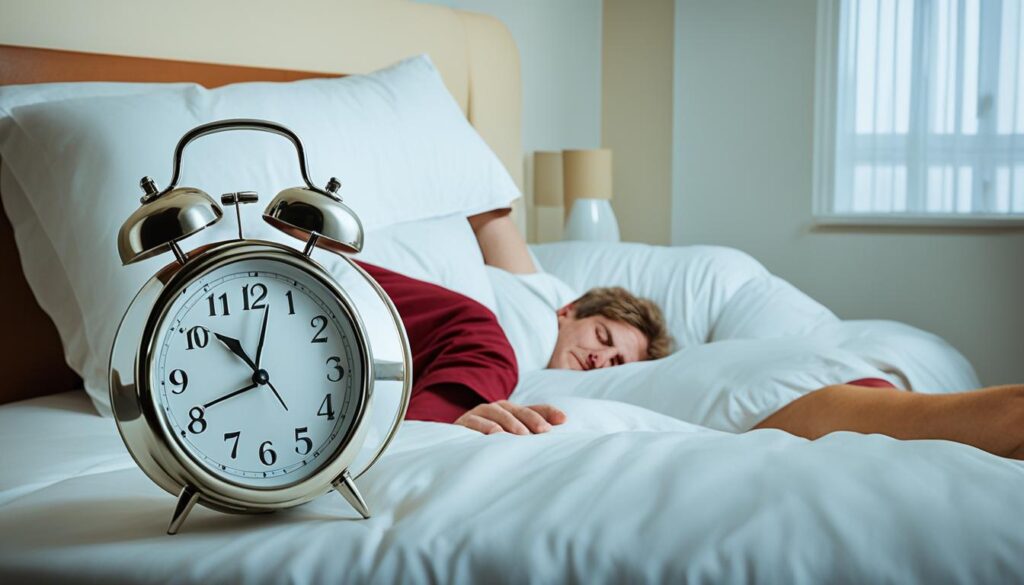
The Impact of Daylight Saving Time on Sleep:
- Loss of one hour of sleep
- Disruption of circadian rhythm
- Increased risk of sleep deprivation
- Impaired alertness and concentration
- Increase in motor vehicle accidents
- Potential rise in cardiac events
The Role of Diet in Sleep Quality
Diet is key to a good night’s sleep. What we eat greatly impacts how well we sleep. This includes our ability to fall asleep and the quality of sleep we get.
Caffeine can mess with our sleep. It can make it hard to fall asleep or stay asleep at night. It’s wise to cut back on caffeinated drinks like coffee and energy drinks in the evening.
Some foods, however, can help us sleep better. Tart cherries are full of melatonin, which helps control our sleep cycles. Eating them or drinking tart cherry juice can improve how well and how long we sleep.
Kiwi is another fruit that aids in better sleep. It’s loaded with antioxidants and serotonin, which helps with sleep. Eating a kiwi before bed may help you sleep faster and more soundly.
The Sleep-Friendly Foods You Should Include in Your Diet
Adding foods that help with sleep can improve your sleep quality. Here are some examples:
- Fatty fish like salmon, trout, and mackerel are rich in omega-3 fatty acids. These fats can improve sleep quality.
- Complex carbohydrates, such as whole grains and legumes, help produce serotonin. This neurotransmitter promotes relaxation and sleep.
- Herbal teas, like chamomile and valerian root, have calming effects. They can help you relax before bedtime and support sleep.
By choosing these sleep-friendly foods and eating healthy, you can sleep better. You’ll wake up feeling refreshed and energized.
“Eating well helps you sleep well. A balanced diet that includes sleep-friendly foods can positively impact your sleep quality.”

It’s important to note that dietary needs vary from person to person. Pay attention to how your body reacts to different foods. Try adding sleep-friendly foods to your diet and see if your sleep improves. Small changes in your diet can greatly affect your sleep habits and overall health.
The Impact of Alcohol and Screens on Sleep
Good sleep is vital for health and happiness. But, drinking and too much time on screens can harm your sleep quality.
Alcohol and Sleep
Some think alcohol helps sleep, but it actually makes it worse. It may seem to help you fall asleep, but it ruins the quality of rest. You end up with a choppy sleep that doesn’t refresh you.
Drinking before bed can lead to more snoring and sleep apnea. It also messes with melatonin, your sleep hormone. This makes keeping a normal sleep schedule hard.
Screens and Sleep Quality
Screens right before bed are bad for sleep. The blue light from phones and TVs lowers melatonin. This makes falling asleep tough and messes with your sleep cycle.
Studies show blue light delays sleep and cuts it short. The fun stuff on screens also keeps your brain alert. This makes it hard to calm down and sleep.
“Cutting back on booze and screen time at night can make your sleep better. You’ll feel more awake and lively the next day.”
To sleep well, create a calm bedtime routine. Avoid drinks and screens in the evening. Try relaxing activities like reading or calm exercises for a good night’s sleep.
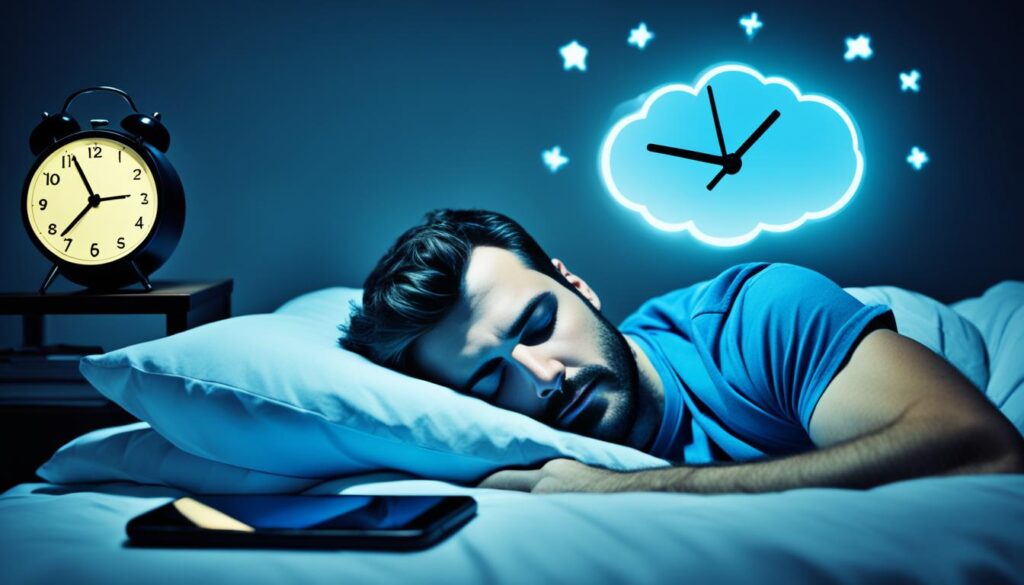
Improving Sleep and Making it a Priority
Simple changes in your sleep habits can greatly improve how well you sleep. Try to go to bed and wake up at the same time every day. This helps set your body’s clock and leads to better sleep.
To sleep better, make sure your bedroom is ideal for rest. It should be dark, quiet, and cool. Choose a comfy mattress and pillow for your body’s needs. You might also want to use blackout curtains, earplugs, or a white noise machine.
If sleep issues continue, getting professional help is key. There are treatments for problems like insomnia or sleep apnea. These can make a big difference in how well you sleep. A sleep specialist can offer the right help for you.
Sleep is not just for relaxation; it’s a need for our bodies. Making sleep important is vital for good health. By following these sleep tips and valuing sleep, you’ll experience the joys of sound sleep.